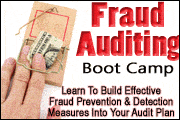Fraud Audit School Agenda

Seminar: ID# 1003310

Agenda
1. Understanding How Fraud Occurs
- Integrating The Fraud Theory Into Your Audit
- Incorporating The Fraud Audit Matrix
- Comparing Approaches: Internal Audit, Fraud Audit, And Forensic Investigation
- The Fraud Triangle: Opportunity, Pressures, And Rationalization
- Identifying Who Commits Fraud
- Fraud In Plain English
- Identifying What Actually Constitutes Fraud In Your Organization
- How Perpetrators Conceal Fraud
- The Premise Of Concealment And Concealment Strategies
- Conversion: How Perpetrators Benefit From The Fraud Scheme
- Identifying Types Of Conversion And Understanding Different Audit And
- Industry Strategies
2. Building Fraud Scenarios
- Understanding The Fraud Risk Structure
- The Inherent Fraud Schemes In Every Business System
- How To Build Fraud Scenarios For Individual Audit Programs
3. Preparing a Business Process Fraud Risk Assessment for Audit Programs
- Using The Drill-Down Approach To Identify Scheme Variations For Each Business System
- How To Link Fraud Risks For Each Business Process To Your Control Structure
- Establishing A Score For Mitigation Of Fraud Risk By Internal Controls
- How To Link The Control Fraud Scores To The Audit Response
4. Incorporating Fraud Risk Assessment into the Audit Program
- Fraud Scheme Approach
- The Fraud Opportunity Approach
- Techniques To Assess The Risk Of Fraud
- Linking Internal Controls To Fraud Risk
- Linking The Audit Response To Fraud Risks
- Individual And Aggregate Fraud Risks
- Business Risk Factors
5. Integrating Fraud Testing into Your Audit Program
- Using Red Flags To Identify Fraud
- How To Build And Analyze Red Flags For Specific Fraud Schemes
- Fraud Data Analysis: Approaches And Strategies
- How To Build The Fraud Data Profile: The Step Approach For Data Mining
- Identifying The Response To Fraud Based On The Fraud Risk Assessment: Control Vs. Fraud Approach
- Incorporating Fraud Steps Into The Audit Program
- How To Design Fraud Audit Procedures To Pierce The Concealment Strategy
- Linking The Audit Program To The Risk Assessment
- Sampling Designed To Locate Fraud
- Testing And Evaluating The Design Of Your Anti-Fraud Controls
- Identifying Suspicious Transactions Through Fraud Audit Procedures
- Protocol For Resolving A Suspicious Transaction
- Writing Fraud Audit Findings And The Legal Considerations Involved
6. Interviewing for Fraud in the Audit Process
- Using The Fraud Scenario Approach
- Understanding The Five Question Types
- Preparation For The Interview Process
- Managing The Reluctant Witness
- Connecting The Fraud Scenario To The Illegal Act
7. Internal Controls and Fraud
- How Controls Are Related To The Fraud Theory
- Fraud Control: Prevention, Detection, Deterrence, Prosecution, And Approval
- Fraud Prevention Programs And Policies
- How To Design Controls To Minimize Fraud
- Managing Fraud Costs
- Developing Fraud Awareness Programs
8. Misappropriation of Assets
- Disbursement Fraud Schemes
- Purchasing Fraud Schemes
- Fraud In Payroll And Human Resource Functions
- Contract Fraud Schemes
- Fraud In Revenue And Cash Receipts Functions
- Theft Of Inventory, Equipment, And Assets
- Travel Expense Fraud Schemes
9. Financial Statement Fraud
- Fraud In The Revenue Cycle
- Inventory Fraud Schemes
- Expenditure Fraud Schemes
- Journal Entry Fraud Schemes
- Management Fraud: Incentive, Opportunity And Rationalization
10. Professional Standards
- Sarbanes-Oxley And PCAOB
- SAS No. 99
- Institute Of Internal Auditors
- Yellow Book
- Current Surveys And Reports On Fraud
11. Fraud Investigation
- Identifying Resources To Conduct An Investigation
- Focusing On Fraud Theory And Development
- Using Private Investigators
- Types Of Interviews And The Appropriate Approach
- Understanding The Interview Methodology
- Legal Considerations When Conducting An Interview
- Appropriate Collection And Analysis Of Documentation
- Forensic Examination Of Documentation
- Individual Rights During Investigations
- Understanding The Civil Court Process
- How The Legal System Works
- Attorney Work Product
- Types Of Evidence
- Web Sites And Fraud Information
12. Interviewing: Admission-Seeking and Legal Elements
- Initial Steps To Securing The Admission
- How To Confront The Suspect
- Use Of Admission Seeking Questions
- Managing The Denial Process
- Using Physical Evidence
- Obtaining The Oral Confession
- What Are The Legal Considerations
- Employees Obligation To Cooperate
- Combating Legal Objections


